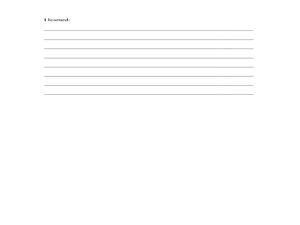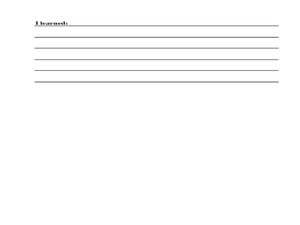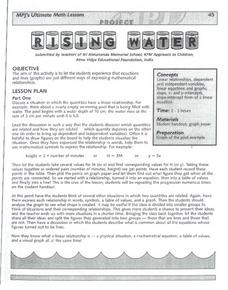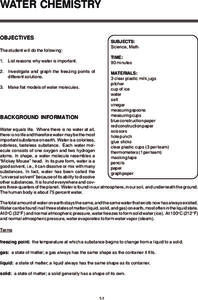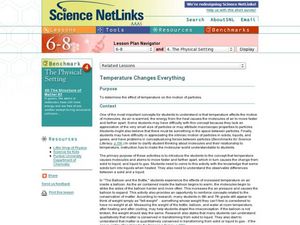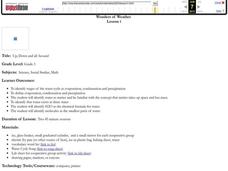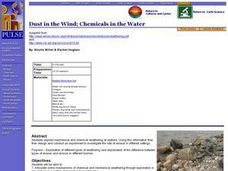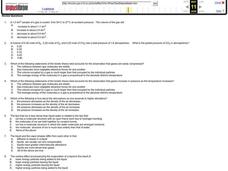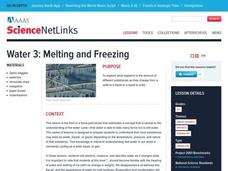American Chemical Society
Heat, Temperature, and Conduction
How does heat move from one item to another, even when the items are in different states of matter? Pupils experiment with adding washers to hot water and adding hot washers to room temperature water to observe the heat transfer.
American Chemical Society
Temperature Affects Density
Different substances can have different densities, but can the same substance have different densities? Lesson explores the effect of temperature on the density of water. Extension idea connects the concept of how melting ice in lakes...
American Chemical Society
Changing State: Evaporation
Why do experiments require a control? Guide scholars through designing an experiment to see what they can do to evaporate water faster with a lesson that stresses the importance of controlling all variables. The second activity...
American Chemical Society
Changing State: Condensation
When you have a cold drink and you notice the water forming on the outside, it is literally pulling the water from the surrounding air to form the condensation. After watching a demonstration of condensation forming on a glass,...
Curated OER
What is Air?
Learners investigate air by participating in a class experiment. In this matter measurement lesson, students identify air as a gas which consists of mass. Learners utilize a windsock or balloon to measure oxygen and explore it's true...
Curated OER
Heat and Matter
Students explore liquids and solids by conducting in class experiments. In this matter lesson, students define the properties of matter and how heat can change those properties. Students experiment with heating objects such as butter and...
Curated OER
Building Blocks of Matter
Students view videos and worksheets and construct a model of a water molecule. In this atomic structure instructional activity, students view video clips and handouts about matter and nanoscience. They construct a model of a water...
Curated OER
Changing States of Matter - Making Ice Cream
Students make ice cream as a result of viewing changes of states of matter. In this matter lesson plan, students learn how heating and cooling can effect a state of matter to change.
Curated OER
Rising Water!
Students observe water change from a liquid to a gas state when heated and then return to its liquid stage when cooled. They learn that gas molecules move faster than liquid molecules. They discover physical properties that describe how...
Curated OER
The Water Cycle/States of Matter
Students engage in a lesson that is concerned with the water cycle and different states of matter. They conduct research using a variety of resources in preparation for taking a quiz. Then students take the quiz in correlation to having...
Curated OER
States of Matter
Pupils study the vocabulary of the states of matter. In this states of matter vocabulary lesson, students investigate and study the meaning of the words solid, liquid, and gas. They experience demonstration lessons that give them...
Curated OER
WATER CHEMISTRY
Students list reasons why water is important and investigate and graph the freezing points of different solutions.
Curated OER
Matter: Build a Word
Fourth graders examine matter and the periodic table of elements. In this matter lesson, 4th graders discuss atoms and their composition. Students explore the periodic table of elements and use it to spell words out of the elements.
Curated OER
Water and Ice
Learners examine water. In this chemistry lesson plan, student examine the physical properties of water and how it changes from a liquid to a solid or a gas. This lesson plan contains links to a second and third complimentary lesson plan...
Curated OER
Investigating the Shapes of Covalent Molecules and Measuring their Respective Bond Lengths and Bond Angles
High schoolers will draw Lewis structures of common covalent compounds using a Chem 3D computer program. They will predict the shapes of the molecules, complete a data table, and formulate rules for predicting shapes of molecules. In the...
Curated OER
Water and Ice
Students observe water as it changes form. For this water lesson students observe, measure, and describe water as it changes state.
Curated OER
Temperature Changes Everything
Middle school chemists visit interactive websites in order to discover what happens to molecular motion when heat is added to matter. They conduct an experiment that demonstrates the expansion of matter with the addition of heat. A lab...
Curated OER
Wonders of Weather
Fourth graders complete activities to study weather and the water cycle. In this water cycle lesson, 4th graders observe a demonstration of the three stages of water. Students work in groups to complete a water cycle lab activity....
Curated OER
Putting the Ice in Hockey
Eighth grade physical science classes examine why the ice on which hockey is played is slippery. They do so by discussing phases of matter and the molecular motion in each. They read an article on a website and write out answers to...
Curated OER
Dust in the Wind; Chemicals in the Water
Students explore mechanical and chemical weathering at stations. They articulate some mechanisms of chemical and mechanical weathering through exploration in a lab. Students stations describe how chemical weathering differs from...
Curated OER
Phases of Matter
In this matter worksheet, students calculate volume and partial pressure for gases, compare liquid and vapor phases, and review the characteristics properties of gases. This worksheet has 12 multiple choice and 3 problems to solve.
Curated OER
The Nature of Chemical Change: Acting Out an Example
Students identify the signs that a chemical reaction took place. In this chemistry lesson, students role play the movement of different molecules of matter. They classify matter according to their properties.
Curated OER
Water Cycle Activity
Young scholars build a model and observe the cycle of evaporation and condensation that occurs in the water cycle. They see how the water cycle works, such as water condensing on the side of the jar and drops precipitating into rain...
Curated OER
Melting and Freezing
Learners explore how various substances change from a solid to a liquid or from a liquid to a solid and how temperature, pressure and nature play an important role in this process. In this melting and freezing lesson,...





